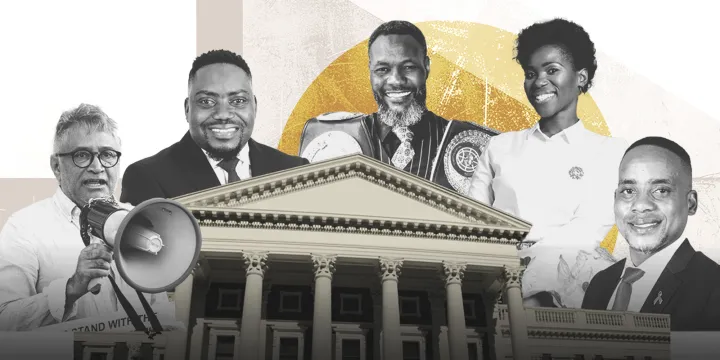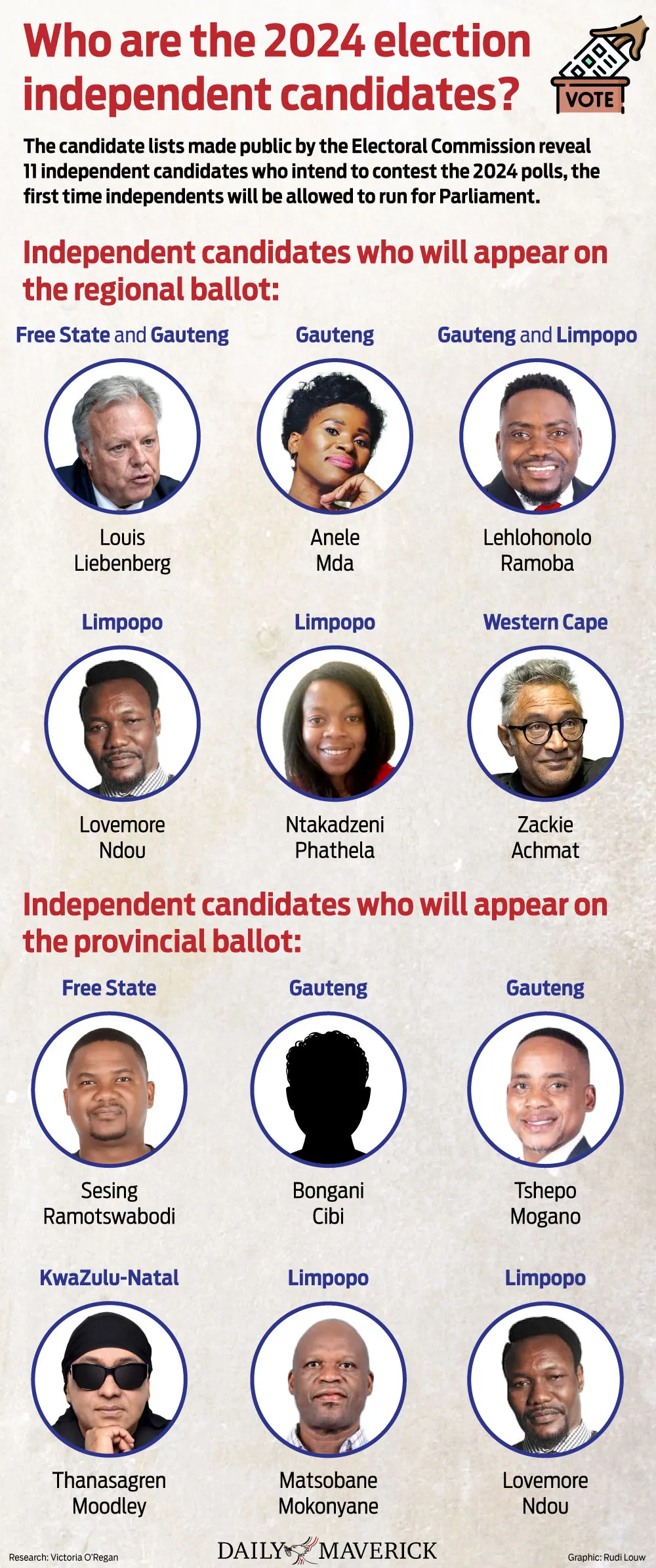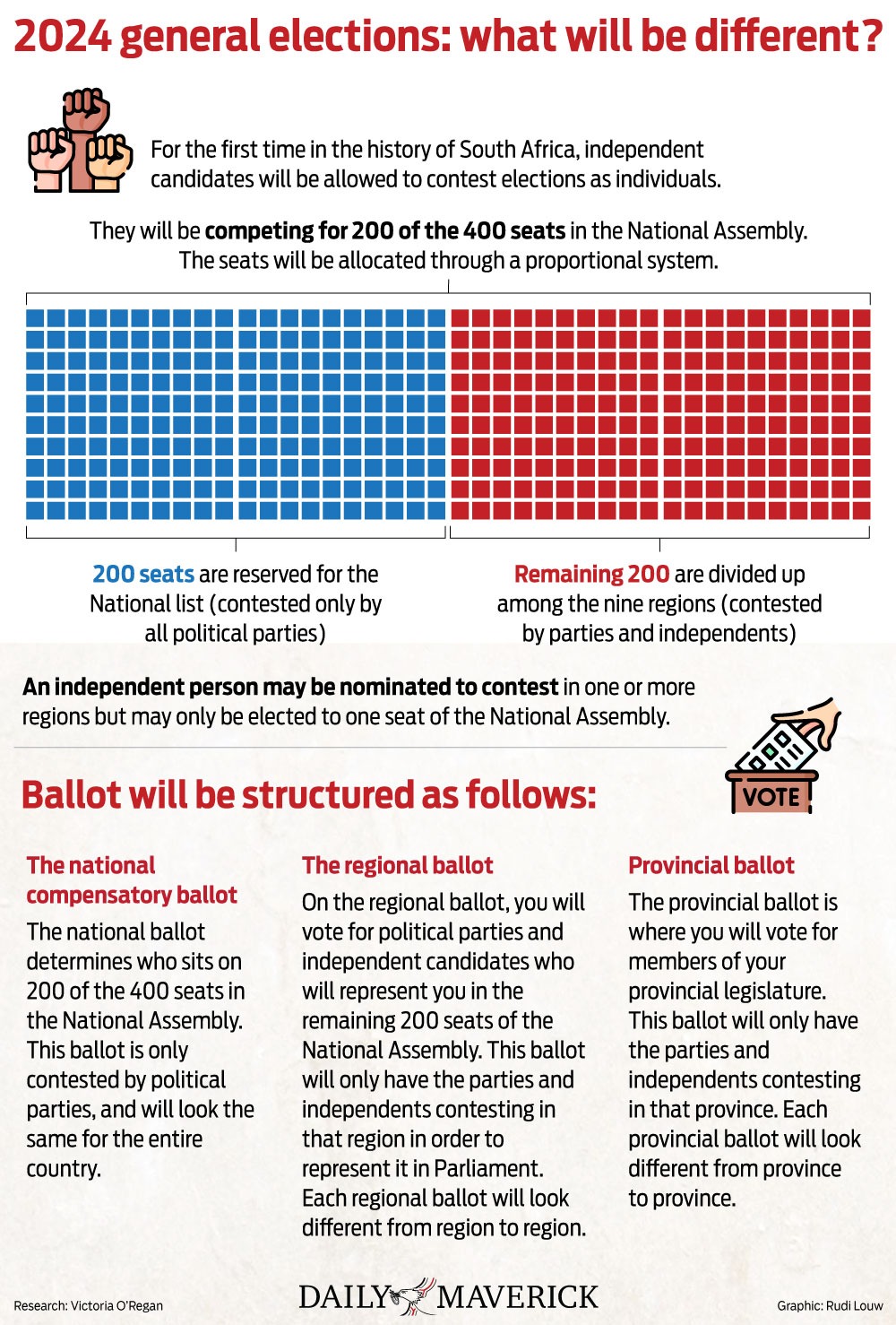ROAD TO 2024 ELECTIONS
The Independents (Part One): No easy walk to SA Parliament for those who go it alone

At most, South Africa could have 10 independent candidates on the ballot on 29 May, despite the push for changes in electoral law to allow for their inclusion. As the 2024 national election comes into focus, who are these independents entering the fold?
The candidate lists made public by the Electoral Commission of SA (IEC) on Tuesday reveal 10 independent candidates who intend to contest the 2024 polls, the first time independents will be allowed to run for Parliament in SA.
The IEC received 16 submissions from independents when it closed its candidate registration on 8 March, but only 10 have made it to the provisional lists.
Five independent candidates qualified to contest for seats in the National Assembly, and six will contest the provincial legislature elections, the IEC said.
(The candidate lists were made public for inspection, and any objections to candidates needed to be made by 27 March. A final list of candidates will be released on 10 April.)
Read more in Daily Maverick: Elections 2024 – All your questions answered
Most of the independents are unknown to the public and cannot be found through a simple Google search. The exception is veteran activist Zackie Achmat, the only candidate from the Western Cape, who is vying for a seat in the National Assembly.
The remaining independents on the regional list are former Cope MP Anele Mda (Gauteng), and Ntakadzeni Phathela and former boxing champion Lovemore Ndou (both from Limpopo). The president of the Mining Forum of SA, Lehlohonolo Blessings Ramoba, is on both the Limpopo and Gauteng lists.
For more on Daily Maverick’s The Independents series, read Part Two and Part Three.
Independent candidates contesting for seats in the provincial legislatures are: Bongani Cibi and Tshepo Mogano (Gauteng), Ramotswabodi Sesing (Free State), Thanasagren Moodley (KwaZulu-Natal) and Matsobane Mokonyane and Ndou in Limpopo.
Ndou announced his candidacy only in December. He is, however, the only independent candidate who has seemingly managed to raise the funds needed to throw his hat in the ring for a seat in the National Assembly and in a provincial legislature.
If he wins both, he will have to choose one, as an independent candidate may only be a member of either the National Assembly or a provincial legislature.
Sesing was nominated as an independent, but also appears on the list of the Economic Liberators Forum South Africa’s party list.
Read more in Daily Maverick: SA’s 2024 elections party lists — the bad, the weird and the ugly
What made them eligible?
To make it on to the provisional lists, these independent candidates needed to garner 1,000 signatures and pay a deposit to the IEC. This follows a Constitutional Court judgment in December which ruled that the requirement for an independent to obtain 11,000 to 14,000 signatures was unconstitutional and that independent candidates need only secure 1,000 signatures to gain ballot access.
Independent candidates, like political parties, also had to pay a deposit to participate in the polls. To contest a regional election, the IEC determined that independent candidates had to pay a deposit of R20,000 per province in which they intended to contest.
Independent candidates contesting provincial legislature elections have to pay a deposit of R15,000.
The National Assembly is made up of 400 seats, of which 200 are contested only by political parties — independent candidates can only contest half of the seats in the National Assembly.
If an independent wants to be elected to a provincial legislature, they can only contest in the province where they are registered to vote.
An independent candidate may be nominated to contest in one or more regions (provinces), but may only be elected to one seat in the National Assembly.
How will the ballots work in the 2024 election?
Voters will receive three ballots instead of the usual two when they head to the polls on 29 May. See Daily Maverick’s graphic below to understand the new three-ballot system.
So, what are their chances of winning a seat in the National Assembly?
It is unclear if any of these candidates will win a seat in the National Assembly. They will need to attract big support to be elected — probably at least 50,000 votes, depending on how many people cast their votes, Daily Maverick’s Stephen Grootes reported. Election analyst Wayne Sussman puts that figure a bit higher — estimating that about 40,000 votes are needed for political parties to win a seat, and about 70,000 votes for an independent to get a seat.
Several polls have predicted the support for various political parties, but none have analysed the popularity of independent candidates.
“We have not yet come across an empirical study that speaks to voter interest or voter appetite for participation of independent candidates. The only empirical studies that we have so far that have examined voting behaviour and voting preferences since 1994 speak to parties, party identity and party loyalty,” governance expert Professor Samuel Koma, from the University of Limpopo, told Daily Maverick.
The landmark Constitutional Court ruling in June 2020, paved the way for independent candidates to contest in the national and provincial elections.
“If you look at the 2021 local government elections outcomes, we saw an increased number of candidates contesting as independents in the wards. Most of the time, the candidates who tended to win the wards as independent candidates were the ones who were drawn from political parties — either they resigned, or they were suspended — because of their popularity,” Koma said.
However, it’s easier to win as an independent candidate in a ward — the stakes are considerably higher in a national election.
Support for individuals will ultimately depend on the strength of their campaigns, Koma said.
“We have not seen much movement and visibility of independents — maybe now that the IEC has [received their nomination requirements]. We know that elections are expensive — we know this from political parties. So independents also need adequate funding and resources in order to hit the ground running,” he said. DM



















Unintended consequences. The massive signature requirement turned out to be unnecessary to thwart independents. However, it was not overturned for parties not represented in parliament, making it much harder for them to run nationwide. Those that did cross that hurdle had to be be very organised. I will be interested to see how that translates into their ground game, a critical requirement to do well in elections (much underrated, vs. the obvious things like posters, speeches and rallies).
I would like to see a list of unrepresented parties that have qualified nationwide or in most provinces – e.g., I know Rise Mzansi has. But who else? Forum 4 Service Delivery I believe has qualified in most provinces too.
Independents have a better chance, and are more worth considering, at local government level. Say the community expresses a very clear set of priorities to the person they have just elected. That person then goes to council, with good intent, but is told by the party whip that that’s not a priority, THIS is.
Some parties will revoke your membership for defying the whip. At that point you lose not only your access to all the party’s resources, but you lose your seat too. So you vote as whipped.
Meanwhile the community wonders why the hell they bothered voting for somebody who nods to everything they asked for, then did something else.
That community would much rather have a candidate they can control. IE an independent.
There’s a downside of course. The independent is outside of a party structure and has to find support for whatever it is they are agitating for, but at least the community feels that their voice, rather than the party’s, is the one being heard. And besides if their neighbours feel the same, and have also got an independent in then there’s some support.
That makes sense, rebels with causes
To early to say anything substantial but would like to be kept posted